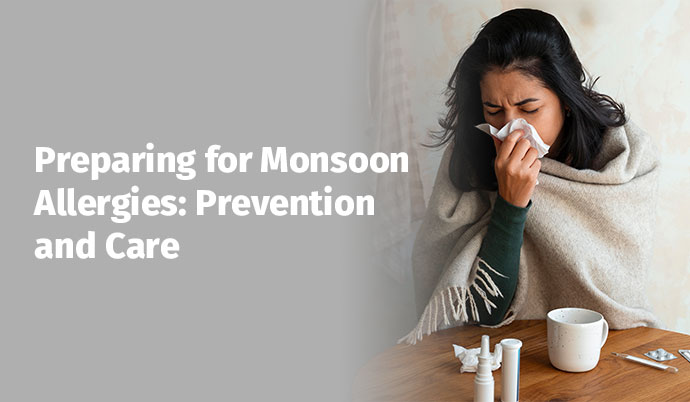
It so happens that these romantic vibes also come with an entourage of unwanted guests, the Allergens such as moulds, dust mites, and loads of moisture willing to play havoc with your immune system. As per the data given by the Indian Council of Medical Research (ICMR), an Indian prevalence of allergic diseases in India is more than 20-30%, and that too reaches a high during monsoons. It is more than just a sniffle; it is a complete seasonal health warning.
Even your cosy corner is not a safe space anymore, as there is more dampness in the air, and enclosed areas are breeding grounds of triggers. Therefore, to experience the rains and not to transform into a walking tissue box, it is high time to rain-proof the lungs, skin, and sinuses. Monsoons must be about prevention instead of prescriptions!
What Causes Allergies During the Monsoon?
In simple language, allergies are a novice play drama of what should be nothing in your body. This is because, due to the overload of moisture during the monsoon, our immediate environment turns into the perfect place for the growth of mold, mildew, pollen, mites, bacteria and fungi. Add a wet atmosphere and sealed ventilation to that, and you are at an allergy hub.
Allergies of Monsoon in India
Whenever you are feeling the above symptoms, do not dodge them as the body’s reaction to the seasonal change. It may be a disguised allergy.
The last piece of your favourite samosa or that tempting-looking pakoda on the street is more infectious than you will ever know.
How does Monsoon aid in worsening Allergies?
The antagonist in this season of allergies is humidity. Mattresses, cupboards, and other items grow mold in the presence of moisture, and since the moisture in the form of puddles and corners provides fungi with a place to party, leaky corners are the perfect place to have fungi as a guest. Do not forget to close the windows so that rain does not enter, and thus allergens remain closed inside, just like the uninvited guests are intended not to be the guests at your marriage affair.
Prevention Tips for Allergy Control During Monsoon
Continuous symptoms need to be checked by a specialist from the best medicine hospital in Delhi. Do not consider the signs of allergies as a seasonal visitor. In case the termination is prolonged (more than 7 -10 days), or it is becoming hard to breathe, go to the pulmonologist or to the allergist without wasting another second, because you might require allergy tests or inhalers and antihistamines.
Some Effective Home Remedies
You must also consider that blindly following self-medication is not the way to go. What is good to one may be stimulative to another. Hence, before submerging into any medications, do not forget to consult a specialist.
Monsoons may come with a refreshing breeze, but it is going to be notorious for our health no matter what. So don't forget to take the initiative, keep clean, eat consciously, and treat symptoms sooner. And with a few desi homemade tips along with your fair share of good habits, you will never have to be the next walking tissue box. Just bear in mind that it is a season of romance, rejuvenation, and not rashes. So, keep dry, drink some kadha, and do not allow allergens to ruin your monsoon mood! And even after precautions, you are not able to get over the monsoon allergies, feel free to reach out to the specialists and book an appointment at Sir Ganga Ram Hospital today.




